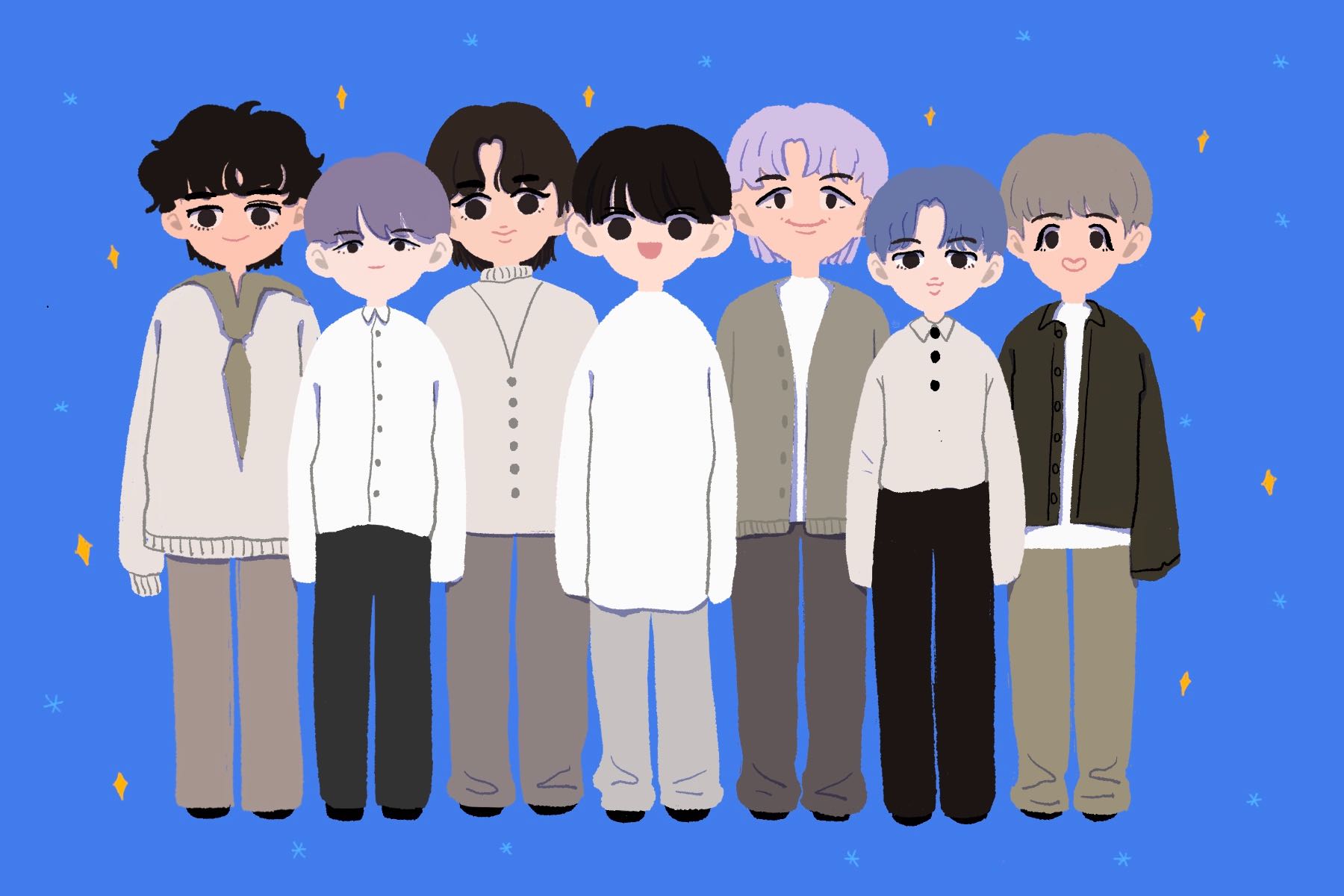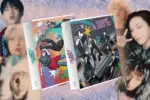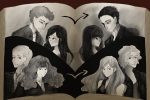Over the past few years, BTS has made their mark on the American music industry. Their achievements involve many firsts, as the first South Korean band to win a Billboard Music Award, perform “at a major U.S. awards show” and be certified gold by the RIAA. Their new recording, “Map of the Soul: 7,” has become “the first album by an Asian group to take top spots on all the charts of the world’s five largest music markets.”
Despite what it seems, BTS didn’t simply come into popularity out of nowhere. Their rise has been slow: They started out at their small record label (Bighit Entertainment), and for a few years, weren’t immensely popular. Only in 2015, two years after their first release, were they able to land their first win on a music show.
BTS’ fight for success is well-known among fans — many members came from poor families, disapproving parents and faced struggles with mental illness. Before and after their debut, the band worked hard to create a name for themselves. The grueling work they’ve put into achieving their dreams is what “Map of the Soul: 7” is all about. The album explores their ambitions, rise to fame and how their attitudes toward success have changed over the years.
“Map of the Soul: 7” carries a total of 20 tracks; it’s a continuation of their previous release, “Map of the Soul: Persona.” The record ranges in genre, shifting between hip-hop to alt-pop and blending the two together. When asked about which styles of music they wanted to explore in the future, Suga said, “It’s less and less meaningful to divide music into genres now.”
Members J-Hope, V and Jungkook added, “The genre is BTS. That’s the genre we want to make and the music that we want.” Their sound on “Map of the Soul: 7” is both versatile and distinctly BTS.
The first five tracks on the album are taken from their last record, followed by “Interlude: Shadow.” The track is performed by rapper and producer, Suga. He starts mellow, with soft rap that alludes to his past self, describing his former vision as the boy who “got a big dream.” He says: “You achieved everything without regrets. And on top of that, you have a big house, big cars, big rings” — a reference to BTS’ debut single, where he raps: “I wanna big house, big car and big rings.” The song builds suspense, changing from a gentle rap, into an aggressive hip-hop track, blending melancholic backing instruments with a hard-hitting electric guitar.
“Interlude: Shadow” is a reference to Carl Jung’s theory that suggests that perhaps people don’t know themselves as well as they’d think. Similarly, the track questions why, after achieving everything he dreamed of and far more, is he not completely happy?
Suga analyzes his awareness of the fleeting nature of fame: “No one told me how lonely it is up here, I can leap in the air but also plunge,” indicating that the higher the achievements, the more rapidly fame and success can be taken away. This lays out the groundwork for the themes of the rest of the album.
On the second track, “Black Swan,” the LP shifts from assertive hip-hop to soft and classical-influenced pop. The song blends string instruments and trap beats. It explores the fear of losing the passion to do what you love, referencing Martha Graham: “A dancer dies twice — once when they stop dancing, and this first death is the more painful,” with lyrics “the heart no longer races when the music plays […] that would be my first death, I’ve been always afraid of.”
While the sound of the song remains feathery, elegant and dynamic throughout, the auto-tune on the vocals detracts from its gentle atmosphere. Even the harmonies on the backing tracks are auto-tuned, feeling mismatched and restricting the vocalists’ chance to demonstrate their abilities.
Songs “Filter,” “My Time” and “Louder Than Bombs” are synth alt-pop tracks that provide an easy-to-listen-to vibe and thoughtful commentary on personal experiences. Jimin’s Latin-inspired “Filter” sounds cheerful, catchy and cheeky as he sings, “Which me do you want?” suggesting that he’s had to change himself to fit particular expectations.
Jungkook’s “My Time” is harmonious and gentle, blending his vocals on top of one another to complement the grooving beat. Co-written with Troye Sivan, “Louder Than Bombs” is a slow and synth-building mix of breathy vocals and soft rap. It explores the difficulty of their jobs as artists, but also acknowledges that many envy their position.
While their lyrics are perhaps vague to those who are unaware of BTS’ background, fans are likely to recognize subtle references, like Jungkook’s allusions to being forced to grow up quickly — since he joined BTS for training at age 13, and made his debut at age 15. The songs complement each other as they’re similar in sound, providing easy transitions for a seamless listening experience.
“ON” is a groovy hip-hop track, packed with rolling keyboard chords, marching band drums and a gospel choir. The song is incredibly dynamic, switching from up-tempo to a slow, brassy, vocal solo and ending off with choir harmonies.
The album keeps its aggressive atmosphere for energetic and hostile “UGH!,” performed by rappers RM, Suga and J-Hope. It features fast-rap, heavy bass and, as described by music critic Anthony Fantano, commentary on “anger as human experience.”
Suga once said, “It isn’t a BTS album if there isn’t a track criticizing society.” “UGH!” critiques spiteful and unsympathetic critics who ask the band “What’s so bad about being sworn at? You earn [money] well, why are you whining?” The track is a reminder that the artists are only human too: “At someone’s indecency, someone [else] becomes hopeless.”
“Map of the Soul: 7” takes a turn for smoother songs: “00:00,” “Inner Child,” “Friends” and “Moon.” Melodious “00:00” is uplifting as vocalists Jin, V, Jimin and Jungkook sing of “resetting” the day for the better. Up-tempo and string-oriented “Inner Child,” performed by V, reflects on his childhood and embraces self-change.
“Friends” features strong vocals and overlapping harmonies as V and Jimin reminisce on the beginnings of their friendship, asking one another to remain close after their fame dies down. Jin talks about the love he has received from fans on soft-sung “Moon.” This series of songs is like a little nook by the sun: comforting, intimate and, since they’re placed in the second half of the album, easily missed if not searched for.
“Respect,” performed by RM and Suga, starts with an old-school hip-hop scratch and features diverse styles of rap, as they question the differences between feeling love and feeling respect for someone.
“We Are Bulletproof: The Eternal” is gentle and nostalgic, calling back to the history behind the BTS name. Officially, BTS stands for Bangtan Sonyeondan, translating to “Bulletproof Boy Scouts”; J-Hope has described the meaning behind their name as “[protecting] our generation’s thoughts and values from the prejudice that pours down on us like bullets.” However, this name has long been criticized. RM raps, “Everyone laughed at me and I was ashamed of my name.”
“We Are Bulletproof: The Eternal” reflects on BTS’ journey and reclaims their name with confidence: “We’re not afraid anymore, we are together bulletproof.” The song is filled with melancholy and tasteful harmonies and it seems it would be the perfect fit to end the album, both because of its musical atmosphere and lyrical content. Yet, two tracks still remain on the lengthy “Map of the Soul: 7.”
The happy, brassy and groovy “Outro: Ego” is J-Hope’s solo track. Similar to “My Time” and “Inner Child,” it offers a reflection on dreams, changing and past selves.
The last track, “ON (feat. Sia),” acts as a kind of bonus track. While it’s essentially the same as “ON,” it adds additional backing vocals and features Sia as the vocalist in parts of the chorus. However, Sia sounds almost as if she was slapped on top of the original chorus without much thought.
While her voice on her own tracks is undoubtedly full of skill, this particular addition to the song doesn’t complement her sound, and could have been weaved into the piece differently.
Ultimately, “Map of the Soul: 7” is a versatile album, filled with songs of different styles to suit a wide range of tastes, featuring upbeat songs, aggressive diss tracks and moody pop ballads. Long-time fans are likely to appreciate the small references to their earlier years, and while at times subtle and inexplicit, BTS is vulnerable in their telling of what it means to achieve fame.

















